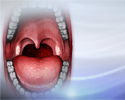Throat swab culture
Throat culture and sensitivity; Culture - throatA throat swab culture is a laboratory test that is done to identify germs that may cause infection in the throat. It is most often used to diagnose strep throat.
Strep throat
Strep throat is a disease that causes a sore throat (pharyngitis). It is an infection with a bacteria called group A streptococcus.

How the Test is Performed
You will be asked to tilt your head back and open your mouth wide. Your health care provider will rub a sterile cotton swab along the back of your throat near your tonsils. You will need to resist gagging and closing your mouth while the swab touches this area.
Your provider may need to scrape the back of your throat with the swab several times. This helps improve the chances of detecting bacteria.
How to Prepare for the Test
DO NOT use antiseptic mouthwash before this test.
How the Test will Feel
Your throat may be sore when this test is done. You may feel like gagging when the back of your throat is touched with the swab, but the test only lasts a few seconds.
Why the Test is Performed
This test is done when a throat infection is suspected, particularly strep throat. A throat culture can also help your provider determine which antibiotic will work best for you.
Normal Results
A normal or negative result means no bacteria or other germs that may cause a sore throat were found.
What Abnormal Results Mean
An abnormal or positive result means bacteria or other germs that can cause a sore throat were seen on the throat swab.
Risks
This test is safe and easy to tolerate. In very few people, the sensation of gagging may lead to an urge to vomit or cough.
References
Allen CT, Nussenbaum B, Merati AL. Acute and chronic laryngopharyngitis. In: Flint PW, Francis HW, Haughey BH, et al, eds. Cummings Otolaryngology: Head and Neck Surgery. 7th ed. Philadelphia, PA: Elsevier; 2021:chap 61.
Bryant AE, Stevens DL. Streptococcus pyogenes. In: Bennett JE, Dolin R, Blaser MJ, eds. Mandell, Douglas, and Bennett's Principles and Practice of Infectious Diseases. 9th ed. Philadelphia, PA: Elsevier; 2020:chap 197.
Gigante J. Acute pharyngitis. In: Kliegman RM, St. Geme JW, Blum NJ, et al, eds. Nelson Textbook of Pediatrics. 22nd ed. Philadelphia, PA: Elsevier; 2025:chap 430.
Stevens DL, Bryant AE, Hagman MM. Nonpneumococcal streptococcal infections and rheumatic fever. In: Goldman L, Cooney KA, eds. Goldman-Cecil Medicine. 27th ed. Philadelphia, PA: Elsevier; 2024:chap 269.
-
Throat anatomy - illustration
Structures of the throat include the esophagus, trachea, epiglottis and tonsils.
Throat anatomy
illustration
-
Throat swabs - illustration
A throat swab can be used to determine if Group A Streptococcus bacteria is the cause of pharyngitis in a patient.
Throat swabs
illustration
-
Throat anatomy - illustration
Structures of the throat include the esophagus, trachea, epiglottis and tonsils.
Throat anatomy
illustration
-
Throat swabs - illustration
A throat swab can be used to determine if Group A Streptococcus bacteria is the cause of pharyngitis in a patient.
Throat swabs
illustration
Review Date: 3/16/2024
Reviewed By: Jatin M. Vyas, MD, PhD, Roy and Diana Vagelos Professor in Medicine, Columbia University Vagelos College of Physicians and Surgeons, Division of Infectious Diseases, Department of Medicine, New York, NY. Also reviewed by David C. Dugdale, MD, Medical Director, Brenda Conaway, Editorial Director, and the A.D.A.M. Editorial team.



